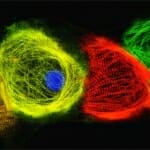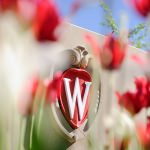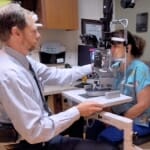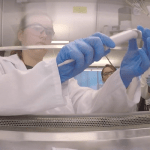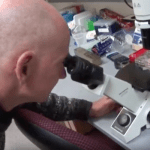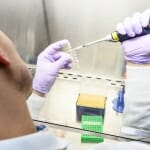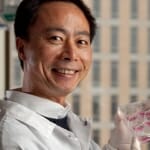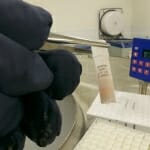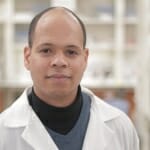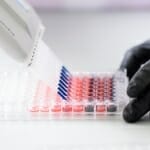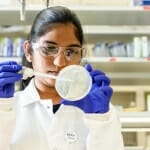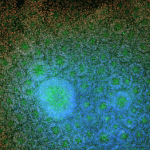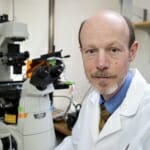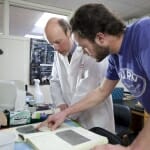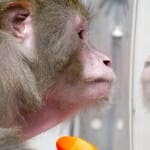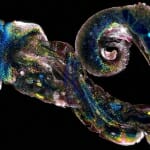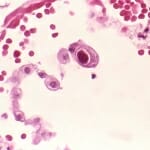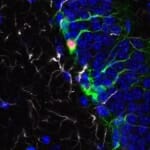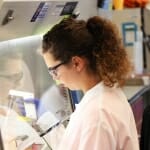Tag Stem cells
A new way to wind the development clock of cardiac muscle cells
A study published in the journal Stem Cells describes a new and unexpected way to accelerate the maturation of induced pluripotent stem cells into cardiac muscle cells.
Video: Stem cells, lab to clinic
David Gamm, director of the McPherson Eye Research Institute, and Forward Bio Institute director Bill Murphy explain how stem cell scientists at UW–Madison are working with industry to put scientific breakthroughs on the path to helping patients.
Stem cell summer camp
The Morgridge Rural Summer Science Camp has allowed more than 500 high-academic achievers from across the state to spend a week learning from leaders in stem cell research.
Waisman’s stem cell research into Down syndrome gives family hope
It’s not a cure for Down syndrome that Dave Witte and Cristina Delgadillo want for their 5-year-old daughter. But they would be happy if stem cell research at the Waisman Center reduces the complications faced by Olivia, who has had two heart surgeries and a stroke.
Stem cells: How we got here, where we’re going
This is the first in a series of four videos about stem cell research at UW–Madison: how it started, what it's achieved, and where it's headed. Catch up on what's happened since James Thomson's prescient prediction that stem cells "will change medicine, period."
After 20 years, stem cells mean business in Wisconsin
At least 10 Wisconsin businesses fundamentally depend, in one way or another, on pluripotent stem cells. In our continuing series, we profile each of these companies, spun off from UW–Madison research.
Randolph Ashton named SCRMC associate director
Ashton, a leading UW–Madison stem cell scientist whose lab develops novel tissue engineering methods to derive brain and spinal cord tissues from human pluripotent stem cells, will assume a leadership position with the Stem Cell and Regenerative Medicine Center.
Twenty years on, measuring the impact of human stem cells
Beginning with just five cell lines derived from surplus embryos donated by patients who had finished undergoing fertility treatments, human stem cell science has mushroomed from just a few isolated labs to a burgeoning global industry and launched the new field of regenerative medicine.
Stem Cells @ 20: Students find inspiration, support in UW–Madison’s stem cell community
When Kaivalya Molugu was considering graduate schools, she knew she was interested in stem cell research, but she had to decide where to apply. The answer soon became clear: the place where it all began.
Stem Cells @ 20: The Stem Cell and Regenerative Medicine center galvanizes stem cell research
In Wisconsin, key to growing and empowering the community of stem cell researchers is the UW–Madison Stem Cell and Regenerative Medicine Center.
Clinical prospects for stem cells begin to emerge
Responsible science is almost always a slow, grueling process, but 20 years after James Thomson derived the first human embryonic stem cell lines, experts in the field of stem cell and regenerative medicine feel more optimistic than ever.
A starring role for nonhuman primates in the stem cell story
“If UW–Madison is the birthplace of human embryonic stem cells, then the Primate Research Center is the cradle,” says Marina Emborg, director of the center's Preclinical Parkinson's Research Program.
Finding a weak link in the frightful parasite Schistosoma
More than 250 million people, mostly in Africa and Asia, have schistosomiasis, which kills an estimated 280,000 each year. “We don’t get that many aha! moments in our lives as scientists,” says a researcher. “This was one of them.”
Cell therapy is the future, and Wisconsin is the place, UW–Madison expert tells Technology Council
UW–Madison has doctors willing to guide the studies that will make or break cell therapy companies. “If you are a clinician, you need a pioneer spirit to do something that has never been done before,” Jacques Galipeau says, “and there are already many like that here.”
Study points researchers toward new therapies for fragile X syndrome
A UW–Madison study showed that the absence of the protein FMRP can unbalance critical molecular processes within adult brain cells and lead to the neural and cognitive changes seen in fragile X.
Stem cell summer camp inspiring early careers in science and technology
The Morgridge Rural Summer Science Camp has allowed more than 500 high-academic achievers from across the state to spend a week learning from leaders in stem cell research, a field that UW–Madison helped make famous.

